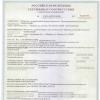Academy Department “Public health and healthcare. Factors for determining the state of working capacity Functions of a certificate of incapacity for work
determines the labor prognosis for a specific disease, a specific position of the patient and his working conditions. Social criteria reflect everything that is connected with the professional activity of the patient: a characteristic of the prevailing stress (physical or neuropsychic), organization, frequency and rhythm of work, load on individual bodies and systems, the presence of unfavorable working conditions and occupational hazards.
Medical and social criteria must always be clearly defined and reflected in medical records.
Therefore, disability should be understood as a condition caused by illness, injury, its consequences or other reasons, when the performance of professional work in whole or in part, for a limited time or permanently is impossible. Disability can be temporary or permanent.
If changes in the patient's state of health are temporary, reversible, if recovery or significant improvement is expected in the near future, as well as restoration of working capacity, then this type of disability is considered temporary. Temporary incapacity for work (TI) is a state of the human body caused by illness, injury and other reasons, in which functional disorders are accompanied by the inability to perform professional work in normal production conditions for a certain period of time, i.e. are reversible. Distinguish between full and partial temporary disability. Complete disability - the complete impossibility of performing any work for a certain period, accompanied by the need to create a special regime and conduct treatment. Partial incapacity for work - temporary incapacity for work in relation to one's usual professional work, while maintaining the ability to perform other work with a different light duty or reduced volume.
Thus, the examination of temporary disability is a type
medical activities, the main purpose of which is to assess the patient's health status, the quality and effectiveness of the examination and treatment, the possibility of carrying out professional activities, as well as determining the degree and timing of temporary disability.
Establishing the fact of temporary disability is of great legal and economic importance, because. it guarantees the citizen the release from work and the receipt of benefits at the expense of the mandatory
state social insurance.
Examination of temporary disability is carried out in institutions of the state, municipal and private healthcare systems. There are the following levels of examination of temporary disability: the first - the attending physician; the second - the medical commission of the medical institution;
the third - the medical commission of the health management authority of the territory included in the subject of the Federation; the fourth - the medical commission of the health management body of the constituent entity of the Russian Federation;
the fifth is the chief specialist in the examination of temporary disability of the Ministry of Health and Social Development of the Russian Federation.
The organization and procedure for conducting an examination of temporary disability are built on the basis of the functions of each of the listed levels.
Control over compliance with the instruction on the examination of temporary disability in state, municipal and private medical institutions, as well as private practitioners, is carried out by the health management body of the appropriate level, professional medical association, executive body of the Social Insurance Fund of the Russian Federation. Commissions for accreditation and licensing of medical and pharmaceutical activities and subdivisions of territorial compulsory medical insurance funds may participate in the exercise of control.
More on the topic Social criterion of working capacity:
- Efficiency as one of the criteria of mental health. Ability to work with anomalies of personality development.
The patient's working capacity is determined by two groups of factors: medical and social.
Medical factors include correctly and timely diagnosis, which is based on a comprehensive examination of the patient.
The need for a thorough comprehensive examination may also arise in cases where there is no correspondence between the subjective sensations of the patient and the data of an objective examination. Various expert situations are possible, for example, there is a lot of subjective, but little objective (such an expert situation occurs quite often). But a situation may arise when the patient (for various reasons) wants to hide the existing disease. In such cases, no complaints are made, and objective studies reveal significant changes.
Clinical expert diagnosis should reflect the following components:
- nosological form of the disease;
- its etiology;
- prevailing syndromes;
- the nature of the course of the pathological process;
- stage (if the disease has a staged course, the frequency and duration of exacerbations, if the disease has a relapsing course);
- the presence and severity of functional disorders;
- the presence and nature of complications;
- accompanying illnesses.
In determining the state of working capacity, along with medical, social factors: profession and specialty of the patient, skill level, nature and conditions of the work performed, the presence of harmful production factors, work experience, age, gender, education, place of residence, marital status, intention to continue working, etc.
However, when conducting an examination of temporary disability, the attending physician, when assessing social factors, first of all, finds out the nature and conditions of the work performed, determining the predominant factor (hard or hard work or hard and hard work), then establishes the degree of severity of the prevailing factor. In this case, the Guidelines for the hygienic assessment of factors of the working environment and the labor process, criteria and classification of working conditions R 2.2.2006-05, approved by Rospotrebnadzor on 29.07.05 and put into effect on 01.11.05, are used.
Thus, a reasonable expert opinion on the state of working capacity and a correct assessment of the clinical and labor prognosis are possible only taking into account medical and social factors, the combination of which determines the practice of two main components of medical expertise: examination of temporary disability and medical and social.
In the majority of patients who apply for medical care, when evaluating the prognosis, medical factors predominate. Social factors prevail much less often, as a rule, with mildly pronounced functional disorders. Therefore, the concepts of temporary and persistent (permanent) disability are medical and social.
Related questions
1. The history of the development of social insurance in Russian Federation. Social insurance fund, its functions.
2. The concept of working capacity, disability, classification.
3. Clinical and labor prognosis.
4. Factors affecting the ability to work. The main causes of temporary disability.
5. Statistical form 16-VN, methods of analysis
6. Solving problems 114–117, preparing an abstract and making a presentation.
Essay topics
1. Social protection and social security of the population.
2. State character of social insurance and social protection of the population.
3. Legislation on social insurance and social protection of the population.
4. Interaction of health authorities and institutions with institutions of social insurance and social protection.
Basic
1. Lisitsyn, Yu. P. public health and health care [Text]: textbook / Yu. P. Lisitsyn. - M.: Medicine, 2007. - S. 402-442.
2. Zakharova, E. V. Collection of problems and independent works [Text] / E. V. Zakharova, I. L. Sizikova. - Abakan: FSBEI HPE "Khakass State University named after. N. F. Katanov”, 2014. – S. 61, 62.
Electronic media
1. Educational portal KhSU them. N. F. Katanov. – URL: http://edu.khsu.ru
2. EBS "Student Consultant" / GEOTAR-Media Publishing House. – URL: http://studmedlib.ru/
Practice 19.
Organization and procedure for conducting an examination of a temporary
disability. Documents certifying VN,
the order in which they are
Relevance of the topic
Issues of medical expertise are encountered daily in the practice of the attending physician. Expertise is the study of special issues, the solution of which requires special knowledge, with the issuance of a certain judgment. A medical examination is understood as a study conducted in the established manner, aimed at establishing the state of health of a citizen, in order to determine his ability to carry out labor or other activities, as well as to establish a causal relationship between the impact of any events, factors and the state of health of a citizen. Thus, to solve the issues of medical expertise, a fairly extensive amount of knowledge is needed.
Lesson objectives:
- to study the procedure for organizing EVN in a medical institution;
- to master the basic concepts and terms of the examination of temporary disability;
- apply the acquired knowledge in practice and perform independent individual tasks.
The initial level of knowledge and skills necessary to achieve the goals: fundamentals of healthcare organization, medical statistics and informatics, computer skills at the user level
Ability to work- a set of physical and spiritual capabilities of a person (depending on the state of his health), allowing him to engage in labor activity. Encyclopedic Dictionary of Medical Terms (ESMT). M., 1984. T.Z.S. 202.
The medical criterion for working capacity is the presence of a disease, its complications, and clinical prognosis.
But not always a sick person must necessarily be disabled. For example, two people of different professions with the same disease: a stamper and a teacher with panaritium. There is a disease. However, a stamper cannot do his job with panaritium, and a teacher can teach a lesson.
Therefore, the doctor, based on the degree of severity of functional disorders, the nature and course of the pathological process, the patient's work, his working conditions, decides his question about the social criterion for working capacity and about issuing a sick leave to the patient. Consequently, the social criterion of ability to work determines, in the presence of a disease, a labor prognosis for a specific position and working conditions.
Medical and social criteria should always be clearly defined and reflected in the outpatient card of a sick person.
The medical criterion is the leading one in establishing the fact of incapacity for work. However, it is not always the disease that is a sign of disability. There are times when healthy person cannot work in his profession. For example, a cook's wife has hepatitis. The cook himself is healthy, but he cannot cook food, as he has a hepatitis contact.
The main task of the examination of working capacity is to determine the possibility this person perform their professional duties depending on medical and social criteria. In addition, the tasks of a medical examination of working capacity include:
* determination of the treatment and regimen necessary to restore and improve human health;
* determination of the degree and duration of disability due to illness, accident or other reasons;
* Identification of long-term or permanent disability and referral of such patients to the medico-social expert commission.
If changes in the state of health are temporary, reversible and recovery or significant improvement is expected in the near future, as well as restoration of working capacity, then this type of disability is considered temporary. Temporary disability by nature is divided into full or partial.
Complete disability is when a person, due to a disease, cannot and should not perform any work and needs a special treatment regimen.
Partial disability is disability in one's profession while maintaining the ability to perform other work. If a person can work in lighter conditions or perform a smaller amount of work, then he is considered partially disabled.
When examining disability, the doctor sometimes has to deal with manifestations of aggravation and simulation.
Aggravation (aggravatio; Latin, aggravo, aggravatum - aggravate, worsen) - an exaggeration by the patient of the symptoms of a really existing disease. Encyclopedic dictionary of medical terms. Ed. 1st. M., 1982. T. 1. S. 23.
With active aggravation, the patient takes measures to worsen his health or prolong the disease. With passive aggravation, it is limited to an exaggeration of individual symptoms, but does not accompany them with actions that interfere with treatment.
Pathological aggravation is characteristic of mental patients (hysteria, psychopathy, etc.), being one of the manifestations of these diseases.
Simulation (Latin simulatio - "pretense") - a person's imitation of the symptoms of a disease that he does not have.
The difficulties of the initial period of the examination of working capacity (the release of the patient from work) are significantly inferior to the difficulties of its final moment - the discharge of the recovered person to work.
The doctor has the right to issue a certificate of incapacity for work until the patient has fully recovered or until the moment when signs of permanent disability clearly appear. However, there are no such objective signs by which it would be possible to establish exactly when the incapacity for work ended and the working capacity was fully restored. Here, fluctuations of 1-2 days are always possible and the correct solution of the issue requires a highly qualified doctor. It is impossible, in the order of "reinsurance", to provide the patient with extra days of release from work and at the same time it is unacceptable to discharge the patient to work before he has recovered.
No less difficulties arise when establishing the moment of transition of temporary disability to permanent ...
EXAMINATION OF WORKABILITY 1. Principles of examination of ability to work. 2. Examination of temporary disability. 3. Spa treatment and medical rehabilitation. 4. The procedure for accounting and storage of disability certificates. 5. Examination of persistent disability. 6. Analysis of morbidity with temporary disability.
 Principles of examination of working capacity 1. The right to resolve all issues related to the incapacity for work of citizens belongs to the state. 2. Preventive direction of expertise with maximum fast recovery employment and prevention of disability. 3. Collegiality in resolving all issues with the simultaneous participation of several specialists and administration in its implementation. The bodies for the examination of working capacity are: 1) medical and preventive institutions, regardless of their level, profile, departmental affiliation and form of ownership, if they have a license for this type of medical activity; 2) bodies of social protection of the population of various territorial levels; 3) trade union bodies.
Principles of examination of working capacity 1. The right to resolve all issues related to the incapacity for work of citizens belongs to the state. 2. Preventive direction of expertise with maximum fast recovery employment and prevention of disability. 3. Collegiality in resolving all issues with the simultaneous participation of several specialists and administration in its implementation. The bodies for the examination of working capacity are: 1) medical and preventive institutions, regardless of their level, profile, departmental affiliation and form of ownership, if they have a license for this type of medical activity; 2) bodies of social protection of the population of various territorial levels; 3) trade union bodies.
 The tasks of the examination of working capacity: -scientifically based assessment of the state of the patient's working capacity various diseases or anatomical defects; establishing the fact of the patient's incapacity for work and his release from work due to the presence of social and medical indications; determination of the nature of disability in a particular patient - temporary, persistent, complete or partial; establishing the causes of temporary or permanent disability of the patient to determine the amount of benefits, pensions and other types social security; rational employment of a patient who does not have signs of disability, but who, for health reasons, needs to alleviate working conditions in his profession; determination of labor recommendations to the patient, which can help him to use the residual working capacity; study of the levels, structure and causes of morbidity with temporary disability and disability at the site; definition various kinds social assistance in case of temporary disability of the patient or his disability; conducting professional (labor) and social rehabilitation of patients.
The tasks of the examination of working capacity: -scientifically based assessment of the state of the patient's working capacity various diseases or anatomical defects; establishing the fact of the patient's incapacity for work and his release from work due to the presence of social and medical indications; determination of the nature of disability in a particular patient - temporary, persistent, complete or partial; establishing the causes of temporary or permanent disability of the patient to determine the amount of benefits, pensions and other types social security; rational employment of a patient who does not have signs of disability, but who, for health reasons, needs to alleviate working conditions in his profession; determination of labor recommendations to the patient, which can help him to use the residual working capacity; study of the levels, structure and causes of morbidity with temporary disability and disability at the site; definition various kinds social assistance in case of temporary disability of the patient or his disability; conducting professional (labor) and social rehabilitation of patients.
 The object of the study of the examination of working capacity is the working capacity of a sick person. The criteria for the examination of working capacity include the correct, timely delivered clinical diagnosis, reflecting the severity of morphological changes, the degree of functional disorders, the severity and nature of the course of the disease, the presence of decompensation and its stage, complications. Great importance has an immediate and long-term prognosis of the disease, the reversibility of morphological and functional changes, the nature of the course of the disease. The social criteria for the examination of working capacity reflect everything that is connected with the professional activity of the patient. These include the characteristics of the prevailing physical or neuropsychic stress, organization, frequency and rhythm of work, the load on individual organs and systems, the presence of unfavorable working conditions and occupational hazards. In the examination of working capacity, clinical and labor prognosis are related to each other and are interdependent. With a favorable clinical prognosis, as a rule, the labor prognosis is also favorable. With a doubtful or unfavorable clinical prognosis, it is necessary to take into account possible positive changes in the state of health under the influence of work.
The object of the study of the examination of working capacity is the working capacity of a sick person. The criteria for the examination of working capacity include the correct, timely delivered clinical diagnosis, reflecting the severity of morphological changes, the degree of functional disorders, the severity and nature of the course of the disease, the presence of decompensation and its stage, complications. Great importance has an immediate and long-term prognosis of the disease, the reversibility of morphological and functional changes, the nature of the course of the disease. The social criteria for the examination of working capacity reflect everything that is connected with the professional activity of the patient. These include the characteristics of the prevailing physical or neuropsychic stress, organization, frequency and rhythm of work, the load on individual organs and systems, the presence of unfavorable working conditions and occupational hazards. In the examination of working capacity, clinical and labor prognosis are related to each other and are interdependent. With a favorable clinical prognosis, as a rule, the labor prognosis is also favorable. With a doubtful or unfavorable clinical prognosis, it is necessary to take into account possible positive changes in the state of health under the influence of work.
 Examination of temporary disability Temporary disability due to diseases internal organs It is subdivided into complete and partial: - complete temporary disability - this is the loss of the working ability to work for a certain period and the need for a special regimen and treatment; - partial temporary incapacity for work - the condition of an ill employee, when he is temporarily unable to perform his usual professional work, but without damage to health he can perform another, with a different regime and volume of work. Examination of temporary disability is carried out in accordance with the Instruction "On the procedure for issuing documents certifying temporary disability of citizens" dated 01.12.1994 No. 713, approved by order M 3 of the Russian Federation dated 19.10.1994 No. 206 "On approval of instructions on the procedure for issuing documents, certifying temporary disability of citizens ", the current legislation and the Regulation "On the examination of temporary disability in medical institutions" dated January 13, 1995 No. 5. The entire organizational structure of the examination of temporary disability is regulated by the above Regulation and the current staffing of institutions and health authorities.
Examination of temporary disability Temporary disability due to diseases internal organs It is subdivided into complete and partial: - complete temporary disability - this is the loss of the working ability to work for a certain period and the need for a special regimen and treatment; - partial temporary incapacity for work - the condition of an ill employee, when he is temporarily unable to perform his usual professional work, but without damage to health he can perform another, with a different regime and volume of work. Examination of temporary disability is carried out in accordance with the Instruction "On the procedure for issuing documents certifying temporary disability of citizens" dated 01.12.1994 No. 713, approved by order M 3 of the Russian Federation dated 19.10.1994 No. 206 "On approval of instructions on the procedure for issuing documents, certifying temporary disability of citizens ", the current legislation and the Regulation "On the examination of temporary disability in medical institutions" dated January 13, 1995 No. 5. The entire organizational structure of the examination of temporary disability is regulated by the above Regulation and the current staffing of institutions and health authorities.
 There are five levels of examination of temporary disability: the first level - the attending physician; the second level is a clinical expert commission of a medical and prophylactic institution; the third level - the clinical expert commission of the health management authority of the territory included in the subject of the Federation; fourth level - clinical expert commission of the health management body of the subject of the Federation; fifth level - chief specialist in the examination of temporary disability M 3 and social development RF. The therapist of the polyclinic is the initial link in the examination of temporary disability. During its implementation, he performs the following functional duties: 1) determines the signs of temporary disability based on an assessment of the state of health, nature and working conditions, social factors; 2) fixes the patient's complaints, anamnestic and objective data in the primary medical documents, prescribes the necessary examinations and consultations, formulates the diagnosis of the disease and the degree of functional disorders of organs and systems, the presence of complications and their severity, causing disability; 3) recommends medical and health-improving measures, the type of medical and protective regimen, prescribes additional examinations, consultations;
There are five levels of examination of temporary disability: the first level - the attending physician; the second level is a clinical expert commission of a medical and prophylactic institution; the third level - the clinical expert commission of the health management authority of the territory included in the subject of the Federation; fourth level - clinical expert commission of the health management body of the subject of the Federation; fifth level - chief specialist in the examination of temporary disability M 3 and social development RF. The therapist of the polyclinic is the initial link in the examination of temporary disability. During its implementation, he performs the following functional duties: 1) determines the signs of temporary disability based on an assessment of the state of health, nature and working conditions, social factors; 2) fixes the patient's complaints, anamnestic and objective data in the primary medical documents, prescribes the necessary examinations and consultations, formulates the diagnosis of the disease and the degree of functional disorders of organs and systems, the presence of complications and their severity, causing disability; 3) recommends medical and health-improving measures, the type of medical and protective regimen, prescribes additional examinations, consultations;
 4) determines the terms of incapacity for work, taking into account the individual characteristics of the course of the underlying and concomitant diseases, the presence of complications and approximate periods of incapacity for work in various diseases and injuries; 5) issues a certificate of incapacity for work (certificate) in accordance with the instructions on the procedure for issuing documents certifying temporary incapacity for work of citizens (including when visiting at home), sets the date for the next visit to the doctor (which makes an appropriate entry in the primary medical documentation). At subsequent examinations, it reflects the dynamics of the disease, the effectiveness of the treatment, justifies the extension of the patient's release from work; 6) promptly sends the patient for consultation to the clinical expert commission to extend the sick leave beyond the deadlines established by the instruction on the procedure for issuing documents certifying temporary disability of citizens, resolving issues of further treatment and other expert issues; 7) in case of violation of the prescribed medical and protective regime (including alcohol intoxication), makes an appropriate entry in the disability certificate and, in the prescribed manner, in the medical history (outpatient card) indicating the date and type of violation;
4) determines the terms of incapacity for work, taking into account the individual characteristics of the course of the underlying and concomitant diseases, the presence of complications and approximate periods of incapacity for work in various diseases and injuries; 5) issues a certificate of incapacity for work (certificate) in accordance with the instructions on the procedure for issuing documents certifying temporary incapacity for work of citizens (including when visiting at home), sets the date for the next visit to the doctor (which makes an appropriate entry in the primary medical documentation). At subsequent examinations, it reflects the dynamics of the disease, the effectiveness of the treatment, justifies the extension of the patient's release from work; 6) promptly sends the patient for consultation to the clinical expert commission to extend the sick leave beyond the deadlines established by the instruction on the procedure for issuing documents certifying temporary disability of citizens, resolving issues of further treatment and other expert issues; 7) in case of violation of the prescribed medical and protective regime (including alcohol intoxication), makes an appropriate entry in the disability certificate and, in the prescribed manner, in the medical history (outpatient card) indicating the date and type of violation;
 8) detects signs of persistent disability and permanent disability, timely organizes the referral of the patient to the clinical expert commission and medical social expertise; 9) carries out medical examinations for long-term and frequently ill patients (citizens who have 4 or more cases and 40 days of temporary disability per year for one disease or 6 cases and 60 days, taking into account all diseases); 10) upon restoration of working capacity and discharge from work, reflects in the primary medical documents the objective status and reasoned justification for closing the sick leave; 11) analyzes the causes of morbidity with temporary disability and primary disability, takes part in the development and implementation of measures to reduce them; 12) constantly improves knowledge on the examination of temporary disability. He conducts his work on the examination under the supervision of the head of the therapy department of the polyclinic. In the absence of the position of the head of the department in the staff list, his functions are performed by the deputy head of the institution for clinical and expert work.
8) detects signs of persistent disability and permanent disability, timely organizes the referral of the patient to the clinical expert commission and medical social expertise; 9) carries out medical examinations for long-term and frequently ill patients (citizens who have 4 or more cases and 40 days of temporary disability per year for one disease or 6 cases and 60 days, taking into account all diseases); 10) upon restoration of working capacity and discharge from work, reflects in the primary medical documents the objective status and reasoned justification for closing the sick leave; 11) analyzes the causes of morbidity with temporary disability and primary disability, takes part in the development and implementation of measures to reduce them; 12) constantly improves knowledge on the examination of temporary disability. He conducts his work on the examination under the supervision of the head of the therapy department of the polyclinic. In the absence of the position of the head of the department in the staff list, his functions are performed by the deputy head of the institution for clinical and expert work.
 On the recommendation of the attending physician and the head of the department, the clinical expert commission (CEC) of the medical institution makes decisions and gives conclusions in the following cases: when extending the certificate of incapacity for work; in difficult and conflict situations examination of temporary disability; when sent for treatment outside the administrative territory; when referring a patient to a medical and social examination; if it is necessary to transfer able-bodied persons for health reasons to another job or rational employment of persons with limited working capacity; in cases of lawsuits and claims of medical insurance organizations and executive bodies of the Social Insurance Fund on the quality of medical care and the quality of the examination of temporary disability; when exempting from exams in schools, secondary and higher educational institutions, granting academic leave for health reasons.
On the recommendation of the attending physician and the head of the department, the clinical expert commission (CEC) of the medical institution makes decisions and gives conclusions in the following cases: when extending the certificate of incapacity for work; in difficult and conflict situations examination of temporary disability; when sent for treatment outside the administrative territory; when referring a patient to a medical and social examination; if it is necessary to transfer able-bodied persons for health reasons to another job or rational employment of persons with limited working capacity; in cases of lawsuits and claims of medical insurance organizations and executive bodies of the Social Insurance Fund on the quality of medical care and the quality of the examination of temporary disability; when exempting from exams in schools, secondary and higher educational institutions, granting academic leave for health reasons.
 The conclusions of the commission are recorded in the outpatient card, the book of records of the conclusions of the clinical expert commission, signed by the chairman and members of the commission. Responsible for the examination of temporary disability in a medical and preventive institution is the head of the institution. Documents certifying temporary incapacity for work and confirming temporary release from work (study) are a certificate of incapacity for work and, in some cases, certificates of the established form, issued to citizens in case of diseases and injuries, for the period of medical rehabilitation, if necessary, care for a sick family member, healthy child a disabled person for the period of quarantine, during maternity leave, during prosthetics in a prosthetic orthopedic hospital. The following have the right to receive a sick leave: -workers and employees; members of collective farms, LLC, AOZT, AOOT; workers and employees working in military organizations or bodies of the Ministry of Internal Affairs and who are not military personnel (secretaries, typists, waitresses, barmaids, nurses, doctors, etc.); foreign citizens (including citizens of the CIS member states) working at enterprises of the Russian Federation abroad, in organizations and institutions of the Russian Federation; refugees and internally displaced persons working at Russian enterprises; the unemployed who are registered with the territorial bodies of labor and employment of the population; persons whose disability occurred within a month after dismissal from work for a good reason; former military personnel dismissed from military service from the Armed Forces of the Russian Federation due to the onset of temporary disability within a month after dismissal.
The conclusions of the commission are recorded in the outpatient card, the book of records of the conclusions of the clinical expert commission, signed by the chairman and members of the commission. Responsible for the examination of temporary disability in a medical and preventive institution is the head of the institution. Documents certifying temporary incapacity for work and confirming temporary release from work (study) are a certificate of incapacity for work and, in some cases, certificates of the established form, issued to citizens in case of diseases and injuries, for the period of medical rehabilitation, if necessary, care for a sick family member, healthy child a disabled person for the period of quarantine, during maternity leave, during prosthetics in a prosthetic orthopedic hospital. The following have the right to receive a sick leave: -workers and employees; members of collective farms, LLC, AOZT, AOOT; workers and employees working in military organizations or bodies of the Ministry of Internal Affairs and who are not military personnel (secretaries, typists, waitresses, barmaids, nurses, doctors, etc.); foreign citizens (including citizens of the CIS member states) working at enterprises of the Russian Federation abroad, in organizations and institutions of the Russian Federation; refugees and internally displaced persons working at Russian enterprises; the unemployed who are registered with the territorial bodies of labor and employment of the population; persons whose disability occurred within a month after dismissal from work for a good reason; former military personnel dismissed from military service from the Armed Forces of the Russian Federation due to the onset of temporary disability within a month after dismissal.
 Leaves of incapacity for work are issued upon presentation of a document proving the identity of the patient (passport or military ID for a soldier). The issuance and extension of a document certifying temporary disability is carried out by a doctor after a personal examination and is confirmed by an entry in the medical documentation justifying the temporary release from work. A document certifying temporary disability is issued and closed, as a rule, in one medical and preventive institution. The following are not entitled to receive a sick leave: military personnel of all categories; graduate students and clinical residents; students of all categories; citizens performing work for private employers; persons working under a work contract, assignments, etc.; unemployed and dismissed from work; patients under arrest or in compulsory treatment by court order; people who do not have an insurance policy.
Leaves of incapacity for work are issued upon presentation of a document proving the identity of the patient (passport or military ID for a soldier). The issuance and extension of a document certifying temporary disability is carried out by a doctor after a personal examination and is confirmed by an entry in the medical documentation justifying the temporary release from work. A document certifying temporary disability is issued and closed, as a rule, in one medical and preventive institution. The following are not entitled to receive a sick leave: military personnel of all categories; graduate students and clinical residents; students of all categories; citizens performing work for private employers; persons working under a work contract, assignments, etc.; unemployed and dismissed from work; patients under arrest or in compulsory treatment by court order; people who do not have an insurance policy.
 In case of diseases (injuries), the local therapist issues a certificate of incapacity for work single-handedly and at a time for up to 10 calendar days and can extend it single-handedly for up to 30 calendar days, with a mandatory examination of the patient at least once every 10 days and taking into account the approved M 3 RF indicative periods of temporary disability for various diseases. Doctors engaged in private medical practice outside of a medical and preventive institution have the right to issue documents certifying temporary incapacity for work for a period not exceeding 30 days. V special conditions(in some areas of rural areas), by decision of local health authorities, the issuance of sick leave certificates may be allowed to the attending physician until full recovery or referral to a medical and social examination. A certificate of incapacity for work is issued on the day the incapacity for work is established, including holidays and weekends. It is not allowed to issue it for the past days when the patient was not examined by a doctor. In exceptional cases, a certificate of incapacity for work may be issued for the past period by decision of the KEK.
In case of diseases (injuries), the local therapist issues a certificate of incapacity for work single-handedly and at a time for up to 10 calendar days and can extend it single-handedly for up to 30 calendar days, with a mandatory examination of the patient at least once every 10 days and taking into account the approved M 3 RF indicative periods of temporary disability for various diseases. Doctors engaged in private medical practice outside of a medical and preventive institution have the right to issue documents certifying temporary incapacity for work for a period not exceeding 30 days. V special conditions(in some areas of rural areas), by decision of local health authorities, the issuance of sick leave certificates may be allowed to the attending physician until full recovery or referral to a medical and social examination. A certificate of incapacity for work is issued on the day the incapacity for work is established, including holidays and weekends. It is not allowed to issue it for the past days when the patient was not examined by a doctor. In exceptional cases, a certificate of incapacity for work may be issued for the past period by decision of the KEK.
 Citizens who applied for medical assistance at the end of the working day, a certificate of incapacity for work, with their consent, is issued from the next calendar day. Citizens sent by the health center to a medical institution and recognized as disabled are issued a certificate of incapacity for work from the moment they apply to the health center. When patients apply after hours for outpatient clinics (evening, night hours, weekends and holidays) for medical care for acute (exacerbation of chronic) diseases, poisoning or injuries at the ambulance station or in the emergency departments of hospitals in cases that do not require inpatient monitoring and treatment, documents certifying temporary disability are not issued. A certificate of any form is issued indicating the date and time of treatment, diagnosis, examinations, the state of working capacity, medical care provided and recommendations for further management of the patient. With the shift nature of the work of the patient, if he was unable to work at the time of applying for medical help, on the basis of the above certificate, the doctor of the polyclinic at the place of permanent observation issues a certificate of incapacity for work for the past period for the days when, according to the shift schedule, he was supposed to go to work, but no more three days. In case of continuing incapacity for work, the certificate of incapacity for work is extended in accordance with the established procedure.
Citizens who applied for medical assistance at the end of the working day, a certificate of incapacity for work, with their consent, is issued from the next calendar day. Citizens sent by the health center to a medical institution and recognized as disabled are issued a certificate of incapacity for work from the moment they apply to the health center. When patients apply after hours for outpatient clinics (evening, night hours, weekends and holidays) for medical care for acute (exacerbation of chronic) diseases, poisoning or injuries at the ambulance station or in the emergency departments of hospitals in cases that do not require inpatient monitoring and treatment, documents certifying temporary disability are not issued. A certificate of any form is issued indicating the date and time of treatment, diagnosis, examinations, the state of working capacity, medical care provided and recommendations for further management of the patient. With the shift nature of the work of the patient, if he was unable to work at the time of applying for medical help, on the basis of the above certificate, the doctor of the polyclinic at the place of permanent observation issues a certificate of incapacity for work for the past period for the days when, according to the shift schedule, he was supposed to go to work, but no more three days. In case of continuing incapacity for work, the certificate of incapacity for work is extended in accordance with the established procedure.
 Citizens outside permanent place of residence, a certificate of incapacity for work is issued (extended) by the attending physician who established the fact of incapacity for work, with the permission of the administration of the medical institution, taking into account the days required to travel to the place of residence. Documents confirming the temporary disability of citizens during their stay abroad, upon return, are subject to replacement with a certificate of incapacity for work by the attending physician with the approval of his administration of the medical and preventive institution. Citizens who need treatment in special medical and preventive institutions are issued by the attending physicians with a certificate of incapacity for work, followed by referral to institutions of the appropriate profile to continue treatment. Disabled citizens sent for consultation (examination, treatment) to a medical institution outside the administrative district, a certificate of incapacity for work is issued for the number of days required for travel, and is extended in the prescribed manner. If it is necessary to transfer a citizen to light work in case of occupational disease or tuberculosis, by decision of the clinical expert commission, he is issued a certificate of incapacity for work for a period of not more than 2 months a year with the mark “additional certificate of incapacity for work”.
Citizens outside permanent place of residence, a certificate of incapacity for work is issued (extended) by the attending physician who established the fact of incapacity for work, with the permission of the administration of the medical institution, taking into account the days required to travel to the place of residence. Documents confirming the temporary disability of citizens during their stay abroad, upon return, are subject to replacement with a certificate of incapacity for work by the attending physician with the approval of his administration of the medical and preventive institution. Citizens who need treatment in special medical and preventive institutions are issued by the attending physicians with a certificate of incapacity for work, followed by referral to institutions of the appropriate profile to continue treatment. Disabled citizens sent for consultation (examination, treatment) to a medical institution outside the administrative district, a certificate of incapacity for work is issued for the number of days required for travel, and is extended in the prescribed manner. If it is necessary to transfer a citizen to light work in case of occupational disease or tuberculosis, by decision of the clinical expert commission, he is issued a certificate of incapacity for work for a period of not more than 2 months a year with the mark “additional certificate of incapacity for work”.
 In cases where the disease or injury that caused disability was the result of alcohol, narcotic, non-drug intoxication, a disability certificate is issued with a corresponding note on the fact of intoxication in the medical history (outpatient card) and in the disability certificate. objective Clinical signs intoxication and the results of laboratory tests are recorded in the "Protocol of medical examination to establish the fact of alcohol consumption and the state of intoxication". In the primary medical documents, a conclusion is indicated on the presence of a state of intoxication and the protocol number: a register of examination cases is filled out. In the sheet of disability in the column "type of disability" an appropriate entry is made with the date and two signatures (the attending physician, head of the department or a member of the KEK). In case of temporary incapacity for work of a woman who is on parental leave, or a person caring for a child, working part-time or at home, a certificate of incapacity for work is issued on a general basis.
In cases where the disease or injury that caused disability was the result of alcohol, narcotic, non-drug intoxication, a disability certificate is issued with a corresponding note on the fact of intoxication in the medical history (outpatient card) and in the disability certificate. objective Clinical signs intoxication and the results of laboratory tests are recorded in the "Protocol of medical examination to establish the fact of alcohol consumption and the state of intoxication". In the primary medical documents, a conclusion is indicated on the presence of a state of intoxication and the protocol number: a register of examination cases is filled out. In the sheet of disability in the column "type of disability" an appropriate entry is made with the date and two signatures (the attending physician, head of the department or a member of the KEK). In case of temporary incapacity for work of a woman who is on parental leave, or a person caring for a child, working part-time or at home, a certificate of incapacity for work is issued on a general basis.
 In case of outpatient treatment of patients for the period of invasive examination and treatment methods (endoscopic examinations with biopsy, intermittent chemotherapy, hemodialysis, etc.), a certificate of incapacity for work, by decision of the clinical expert commission, may be issued intermittently, on the days of appearance in a medical institution. In these cases, the days of the procedures are indicated on the disability certificate and the release from work is made only on these days. Upon the onset of temporary incapacity for work during the period of unpaid leave, maternity leave, on partially paid leave to care for a child, a sick leave certificate in case of continuing disability is issued from the day the specified holidays end. In case of temporary incapacity for work that occurred during the period of annual leave, including during sanatorium treatment, a certificate of incapacity for work is issued in the usual manner. Citizens who independently apply for advisory assistance, undergoing examinations in outpatient clinics and inpatient facilities at the direction of military commissariats, investigating authorities, the prosecutor's office and the court, are issued a certificate of any form. In case of illness of students (students) of secondary and higher educational institutions, for their release from study, a certificate of the established form is issued.
In case of outpatient treatment of patients for the period of invasive examination and treatment methods (endoscopic examinations with biopsy, intermittent chemotherapy, hemodialysis, etc.), a certificate of incapacity for work, by decision of the clinical expert commission, may be issued intermittently, on the days of appearance in a medical institution. In these cases, the days of the procedures are indicated on the disability certificate and the release from work is made only on these days. Upon the onset of temporary incapacity for work during the period of unpaid leave, maternity leave, on partially paid leave to care for a child, a sick leave certificate in case of continuing disability is issued from the day the specified holidays end. In case of temporary incapacity for work that occurred during the period of annual leave, including during sanatorium treatment, a certificate of incapacity for work is issued in the usual manner. Citizens who independently apply for advisory assistance, undergoing examinations in outpatient clinics and inpatient facilities at the direction of military commissariats, investigating authorities, the prosecutor's office and the court, are issued a certificate of any form. In case of illness of students (students) of secondary and higher educational institutions, for their release from study, a certificate of the established form is issued.
 Sanatorium-and-Spa Treatment and Medical Rehabilitation A certificate of incapacity for work is issued before leaving for a sanatorium upon presentation of a voucher (travel) and a certificate from the administration about the duration of the next and additional holidays. For sanatorium-resort (outpatient-resort) treatment, including boarding houses with treatment in sanatoriums "Mother and Child", in tuberculosis sanatoriums, it is issued for the number of days missing for the next and additional holidays and for travel time. With a total regular vacation for 2-3 years, its entire duration is deducted. In the case of using the next and additional holidays before leaving for the sanatorium and the administration of leave without pay for a number of days equal to the next and additional holidays, a certificate of incapacity for work is issued for the period of treatment and travel, minus the days of the main and additional holidays. When a patient is referred to a rehabilitation center directly from hospital institutions, the sick leave is extended by the attending physician of the center for the entire period of aftercare or rehabilitation.
Sanatorium-and-Spa Treatment and Medical Rehabilitation A certificate of incapacity for work is issued before leaving for a sanatorium upon presentation of a voucher (travel) and a certificate from the administration about the duration of the next and additional holidays. For sanatorium-resort (outpatient-resort) treatment, including boarding houses with treatment in sanatoriums "Mother and Child", in tuberculosis sanatoriums, it is issued for the number of days missing for the next and additional holidays and for travel time. With a total regular vacation for 2-3 years, its entire duration is deducted. In the case of using the next and additional holidays before leaving for the sanatorium and the administration of leave without pay for a number of days equal to the next and additional holidays, a certificate of incapacity for work is issued for the period of treatment and travel, minus the days of the main and additional holidays. When a patient is referred to a rehabilitation center directly from hospital institutions, the sick leave is extended by the attending physician of the center for the entire period of aftercare or rehabilitation.
 During the sanatorium and resort rehabilitation of the liquidators of the accident at Chernobyl nuclear power plant, as well as persons with diseases associated with radiation exposure, and working disabled people whose permanent disability is associated with a disease due to radiation exposure, evacuated from the exclusion zone, liquidators of the consequences of an accident at the Mayak production association, etc. sick leave is issued for the entire period of treatment. When registering persons for treatment in rehabilitation therapy centers, the following features should be taken into account. Vouchers to these centers are issued according to the order M 3 of the Russian Federation and social development. Warriors internationalists, participants in the Great Patriotic War, disabled military personnel who have such vouchers receive sick leave for the entire duration of the voucher and travel days. When a disabled child under the age of 16 years is referred for sanatorium-resort treatment at the “Mother and Child” health resort, if there is a medical opinion on the need for individual care for him, a certificate of incapacity for work is issued to one of the parents (guardian) for the entire period of sanatorium treatment of the child, taking into account travel time
During the sanatorium and resort rehabilitation of the liquidators of the accident at Chernobyl nuclear power plant, as well as persons with diseases associated with radiation exposure, and working disabled people whose permanent disability is associated with a disease due to radiation exposure, evacuated from the exclusion zone, liquidators of the consequences of an accident at the Mayak production association, etc. sick leave is issued for the entire period of treatment. When registering persons for treatment in rehabilitation therapy centers, the following features should be taken into account. Vouchers to these centers are issued according to the order M 3 of the Russian Federation and social development. Warriors internationalists, participants in the Great Patriotic War, disabled military personnel who have such vouchers receive sick leave for the entire duration of the voucher and travel days. When a disabled child under the age of 16 years is referred for sanatorium-resort treatment at the “Mother and Child” health resort, if there is a medical opinion on the need for individual care for him, a certificate of incapacity for work is issued to one of the parents (guardian) for the entire period of sanatorium treatment of the child, taking into account travel time
 Citizens referred to rehabilitation clinics scientifically research institutes balneology and physiotherapy, a certificate of incapacity for work is issued by the attending physician of the medical institution on the basis of the conclusion of the CEC for the duration of treatment and travel and, if indicated, is extended by the attending physician of the Institute's clinic. A disability certificate for caring for a patient is issued by the attending physician to one of the family members (guardian) who directly cares for an adult family member and a sick teenager over 15 years of age who receive treatment on an outpatient basis for up to 3 days, by decision of the CEC - up to 10 days; In the event of temporary suspension from work of persons who have been in contact with infectious patients, or as a result of bacterial carriage, sick leave certificates are issued on the proposal of an epidemiologist in a medical and preventive institution, an infectious disease doctor or an attending physician (quarantine). The duration of suspension from work in these cases is determined by the approved periods of isolation of persons who have undergone infectious diseases and those in contact with them. Employees of public catering establishments, water supply, children's institutions in the presence of helminthiasis are issued a certificate of incapacity for work for the entire period of deworming.
Citizens referred to rehabilitation clinics scientifically research institutes balneology and physiotherapy, a certificate of incapacity for work is issued by the attending physician of the medical institution on the basis of the conclusion of the CEC for the duration of treatment and travel and, if indicated, is extended by the attending physician of the Institute's clinic. A disability certificate for caring for a patient is issued by the attending physician to one of the family members (guardian) who directly cares for an adult family member and a sick teenager over 15 years of age who receive treatment on an outpatient basis for up to 3 days, by decision of the CEC - up to 10 days; In the event of temporary suspension from work of persons who have been in contact with infectious patients, or as a result of bacterial carriage, sick leave certificates are issued on the proposal of an epidemiologist in a medical and preventive institution, an infectious disease doctor or an attending physician (quarantine). The duration of suspension from work in these cases is determined by the approved periods of isolation of persons who have undergone infectious diseases and those in contact with them. Employees of public catering establishments, water supply, children's institutions in the presence of helminthiasis are issued a certificate of incapacity for work for the entire period of deworming.
 The order of registration and storage of certificates of incapacity for work Accounting for the forms of certificates of incapacity for work issued by general practitioners is carried out in registration logs (f. 036 / y). Spoiled forms are stored in a separate folder with an inventory, which contains the surname, name, patronymic of the doctor, date of delivery, numbers and series. The destruction of damaged forms is carried out according to the act of the commission created by order of the head of the medical facility at the end of the calendar year, the roots of damaged and used forms are stored for 3 years, after which they are liquidated. Control over compliance with the procedure for recording, storing and issuing certificates of incapacity for work in state, municipal, private medical and preventive institutions, as well as by a private practitioner, is carried out within their competence by the health management body of the appropriate level, professional medical association, executive body of the Social Insurance Fund of the Russian Federation. Commissions (committees, bureaus) for accreditation and licensing of medical and pharmaceutical activities and subdivisions of territorial compulsory medical insurance funds may participate in the exercise of control. For violation of the procedure for issuing certificates of incapacity for work, the perpetrators bear disciplinary or criminal liability in accordance with the legislation of the Russian Federation.
The order of registration and storage of certificates of incapacity for work Accounting for the forms of certificates of incapacity for work issued by general practitioners is carried out in registration logs (f. 036 / y). Spoiled forms are stored in a separate folder with an inventory, which contains the surname, name, patronymic of the doctor, date of delivery, numbers and series. The destruction of damaged forms is carried out according to the act of the commission created by order of the head of the medical facility at the end of the calendar year, the roots of damaged and used forms are stored for 3 years, after which they are liquidated. Control over compliance with the procedure for recording, storing and issuing certificates of incapacity for work in state, municipal, private medical and preventive institutions, as well as by a private practitioner, is carried out within their competence by the health management body of the appropriate level, professional medical association, executive body of the Social Insurance Fund of the Russian Federation. Commissions (committees, bureaus) for accreditation and licensing of medical and pharmaceutical activities and subdivisions of territorial compulsory medical insurance funds may participate in the exercise of control. For violation of the procedure for issuing certificates of incapacity for work, the perpetrators bear disciplinary or criminal liability in accordance with the legislation of the Russian Federation.
 Examination of permanent incapacity for work Permanent incapacity for work is a long-term or permanent incapacity for work or a significant disability caused by a chronic disease that has led to a significant impairment of body functions. Depending on the degree of disability, disability is established. Establishing the fact of permanent disability is a complex and responsible act carried out by a medical and social expert commission (MSEC). A certain procedure for referring a patient to MSEC has been established. The attending physician conducts a thorough clinical, laboratory, instrumental examination of the patient, consults with various specialists if necessary, determines the conditions, nature and severity of work, the presence of occupational hazards, specifies how the patient copes with work, his work setting vi represents the patient to the head of the department. The head of the department compares the data on functional disorders due to the disease with the working conditions of the patient, determines the ability to work, which he fixes in the outpatient card as his conclusion. If there are indications for referral to MSEC, the patient is referred to a clinical expert commission, which makes an appropriate decision. A citizen, on his own initiative, cannot apply to the MSEC for a medical and social examination, he can be sent for this purpose only by a healthcare and social development institution. Usually, patients with a stable disease are sent for medical and social examination. In this case, temporary disability should not exceed 4 months.
Examination of permanent incapacity for work Permanent incapacity for work is a long-term or permanent incapacity for work or a significant disability caused by a chronic disease that has led to a significant impairment of body functions. Depending on the degree of disability, disability is established. Establishing the fact of permanent disability is a complex and responsible act carried out by a medical and social expert commission (MSEC). A certain procedure for referring a patient to MSEC has been established. The attending physician conducts a thorough clinical, laboratory, instrumental examination of the patient, consults with various specialists if necessary, determines the conditions, nature and severity of work, the presence of occupational hazards, specifies how the patient copes with work, his work setting vi represents the patient to the head of the department. The head of the department compares the data on functional disorders due to the disease with the working conditions of the patient, determines the ability to work, which he fixes in the outpatient card as his conclusion. If there are indications for referral to MSEC, the patient is referred to a clinical expert commission, which makes an appropriate decision. A citizen, on his own initiative, cannot apply to the MSEC for a medical and social examination, he can be sent for this purpose only by a healthcare and social development institution. Usually, patients with a stable disease are sent for medical and social examination. In this case, temporary disability should not exceed 4 months.
 To pass the MSEC, 3 documents are submitted: a passport, an open certificate of incapacity for work and a mailing list. The main document when referring to MSEC is the "Referral to MSEC" (f. 088 / y), which indicates the number of issued certificates of incapacity for work, their beginning and end, as well as the reason for temporary disability. The conclusions of a general practitioner, neuropathologist, surgeon, ophthalmologist, and for women - a gynecologist are obligatory. When referring to MSEC, the diagnosis should be formulated in accordance with ICD 10 and contain the definition of the nosological form, the nature and degree of functional disorders, the stage of the disease, the course, indicating the frequency, duration and severity of exacerbations. In addition to the main diagnosis, all concomitant diseases should be reflected. The certificate of incapacity for work is filled in by the KEC, signed by its chairman and certified by the round seal of the medical institution, the date of referral to MSEK is indicated. Health care and social development institutions are responsible for the accuracy and completeness of the information indicated in the referral for a medical and social examination, in the manner prescribed by the legislation of the Russian Federation.
To pass the MSEC, 3 documents are submitted: a passport, an open certificate of incapacity for work and a mailing list. The main document when referring to MSEC is the "Referral to MSEC" (f. 088 / y), which indicates the number of issued certificates of incapacity for work, their beginning and end, as well as the reason for temporary disability. The conclusions of a general practitioner, neuropathologist, surgeon, ophthalmologist, and for women - a gynecologist are obligatory. When referring to MSEC, the diagnosis should be formulated in accordance with ICD 10 and contain the definition of the nosological form, the nature and degree of functional disorders, the stage of the disease, the course, indicating the frequency, duration and severity of exacerbations. In addition to the main diagnosis, all concomitant diseases should be reflected. The certificate of incapacity for work is filled in by the KEC, signed by its chairman and certified by the round seal of the medical institution, the date of referral to MSEK is indicated. Health care and social development institutions are responsible for the accuracy and completeness of the information indicated in the referral for a medical and social examination, in the manner prescribed by the legislation of the Russian Federation.
 A citizen is sent to MSEC after carrying out the necessary diagnostic, therapeutic and rehabilitation measures if there is data confirming a persistent violation of the functions of the body and systems. 1) With an obvious unfavorable clinical and labor prognosis, regardless of the duration of temporary disability, but not more than 4 months. In cases where the temporary disability of a disabled person is due to the progression of the underlying disease or a concomitant disease with an obvious unfavorable clinical and labor prognosis, the patient should be referred for a medical and social examination as soon as possible to change (cancel) labor recommendations and change the disability group. 2) With a favorable labor prognosis in case of prolonged disability up to 10 months (in some cases: injuries, conditions after reconstructive operations, tuberculosis - up to 12 months), to resolve the issue of continuing treatment or establishing a disability group. 3) To change the labor recommendation to a working disabled person in the event of a deterioration in the clinical and labor prognosis. In case of refusal of a healthcare and social development institution to send for a medical and social examination, a person has the right to apply to the Bureau of Medical and Social Examination independently if available medical documents, confirming the violation of the functions of the body, due to diseases, the consequences of injuries and defects, and the associated limitation of life.
A citizen is sent to MSEC after carrying out the necessary diagnostic, therapeutic and rehabilitation measures if there is data confirming a persistent violation of the functions of the body and systems. 1) With an obvious unfavorable clinical and labor prognosis, regardless of the duration of temporary disability, but not more than 4 months. In cases where the temporary disability of a disabled person is due to the progression of the underlying disease or a concomitant disease with an obvious unfavorable clinical and labor prognosis, the patient should be referred for a medical and social examination as soon as possible to change (cancel) labor recommendations and change the disability group. 2) With a favorable labor prognosis in case of prolonged disability up to 10 months (in some cases: injuries, conditions after reconstructive operations, tuberculosis - up to 12 months), to resolve the issue of continuing treatment or establishing a disability group. 3) To change the labor recommendation to a working disabled person in the event of a deterioration in the clinical and labor prognosis. In case of refusal of a healthcare and social development institution to send for a medical and social examination, a person has the right to apply to the Bureau of Medical and Social Examination independently if available medical documents, confirming the violation of the functions of the body, due to diseases, the consequences of injuries and defects, and the associated limitation of life.
 If the patient refuses to be referred to the MSEC or his untimely appearance for examination for an unexcused reason, the certificate of incapacity for work is not extended from the day of the refusal or the day of registration of the MSEC documents. At the same time, in the sick leave in the column “Notice of violation of the regime”, “Refusal to send to MSEC” or “Absence from MSEC” is indicated and the date of refusal or failure to appear is put. MSEC has the right to return the patient to a medical institution as insufficiently examined. In such cases, for the period of examination of his MSEK, the sick leave is extended. Recognition of a person as a disabled person is carried out during a medical and social examination based on a comprehensive assessment of the state of his health and the degree of disability in accordance with the classifications and criteria approved by the Ministry of Health and Social Development of the Russian Federation. If a person cannot appear for an examination for health reasons, a medical and social examination can be carried out at home, in a hospital where a citizen is being treated, or in absentia on the basis of the submitted documents with his consent or with the consent of his legal representative. The institution is obliged to familiarize the citizen in a form accessible to him with the procedure and conditions for conducting a medical and social examination. In the case when a citizen was recognized as a disabled person of the 3rd group, but fell ill again, without having time to start work, with a favorable clinical and labor prognosis, a certificate of incapacity for work is issued on a general basis.
If the patient refuses to be referred to the MSEC or his untimely appearance for examination for an unexcused reason, the certificate of incapacity for work is not extended from the day of the refusal or the day of registration of the MSEC documents. At the same time, in the sick leave in the column “Notice of violation of the regime”, “Refusal to send to MSEC” or “Absence from MSEC” is indicated and the date of refusal or failure to appear is put. MSEC has the right to return the patient to a medical institution as insufficiently examined. In such cases, for the period of examination of his MSEK, the sick leave is extended. Recognition of a person as a disabled person is carried out during a medical and social examination based on a comprehensive assessment of the state of his health and the degree of disability in accordance with the classifications and criteria approved by the Ministry of Health and Social Development of the Russian Federation. If a person cannot appear for an examination for health reasons, a medical and social examination can be carried out at home, in a hospital where a citizen is being treated, or in absentia on the basis of the submitted documents with his consent or with the consent of his legal representative. The institution is obliged to familiarize the citizen in a form accessible to him with the procedure and conditions for conducting a medical and social examination. In the case when a citizen was recognized as a disabled person of the 3rd group, but fell ill again, without having time to start work, with a favorable clinical and labor prognosis, a certificate of incapacity for work is issued on a general basis.
 In cases where a citizen was recognized as disabled without labor recommendations, but continued to work, in case of illness and injury, a certificate of incapacity for work is issued, but at the end of the period of temporary incapacity for work, the column “start to work” indicates “cannot start work as a disabled person of the second (first) group” and this fact is additionally reported to the administration of the enterprise where the specified person works. Medico-social examination of a citizen in most cases is carried out in an institution at the place of his residence or at the place of attachment to the state or municipal medical and preventive institution of health care and social development. MSEC operate on a territorial basis. Primary MSECs are organized on the basis of medical and preventive institutions. These include: district, city and inter-district. The next step is the higher MSEC - republican, regional, regional, and in Moscow and St. Petersburg - the central city MSEC. Primary MSECs are divided into general and specialized commissions. The general profile MSEC includes: three doctors (therapist, surgeon, neuropathologist); representatives of the department of social development; representative of a trade union organization; medical registrar.
In cases where a citizen was recognized as disabled without labor recommendations, but continued to work, in case of illness and injury, a certificate of incapacity for work is issued, but at the end of the period of temporary incapacity for work, the column “start to work” indicates “cannot start work as a disabled person of the second (first) group” and this fact is additionally reported to the administration of the enterprise where the specified person works. Medico-social examination of a citizen in most cases is carried out in an institution at the place of his residence or at the place of attachment to the state or municipal medical and preventive institution of health care and social development. MSEC operate on a territorial basis. Primary MSECs are organized on the basis of medical and preventive institutions. These include: district, city and inter-district. The next step is the higher MSEC - republican, regional, regional, and in Moscow and St. Petersburg - the central city MSEC. Primary MSECs are divided into general and specialized commissions. The general profile MSEC includes: three doctors (therapist, surgeon, neuropathologist); representatives of the department of social development; representative of a trade union organization; medical registrar.
 One of the expert physicians, most often a general practitioner, is appointed chairman. Based on an expert decision, patients are exempted from professional work or training due to health reasons. This conclusion is drawn up in the form of "MSEC Reference". The certificate indicates the group and cause of disability, labor recommendations and the deadline for the next re-examination. Within 3 days, MSEC sends a notice of the established form to the relevant enterprises, organizations, institutions about the decision taken. Without the labor recommendations of MSEK, the heads of enterprises and institutions do not have the right to provide work to people with disabilities. Re-examination of a disabled person is carried out in the manner established for recognizing a person as disabled. Re-examination of disabled people of group I is carried out once every 2 years, disabled people of groups II and III - once a year, and children of disabled people - within the time limits established in accordance with medical indications. Disability is established before the first day of the month following the month for which the re-examination is scheduled. Without specifying the re-examination period, disability is established for men over 60 years old and women over 55 years old, disabled people with irreversible anatomical defects, other disabled people in accordance with the criteria approved by the Ministry of Health and Social Development of the Russian Federation. Re-examination of a disabled person may be carried out in advance, but no more than two months before the expiration of the established period of disability. Re-examination of a disabled person before the established deadlines is carried out at the direction of a healthcare institution in connection with a change in his state of health.
One of the expert physicians, most often a general practitioner, is appointed chairman. Based on an expert decision, patients are exempted from professional work or training due to health reasons. This conclusion is drawn up in the form of "MSEC Reference". The certificate indicates the group and cause of disability, labor recommendations and the deadline for the next re-examination. Within 3 days, MSEC sends a notice of the established form to the relevant enterprises, organizations, institutions about the decision taken. Without the labor recommendations of MSEK, the heads of enterprises and institutions do not have the right to provide work to people with disabilities. Re-examination of a disabled person is carried out in the manner established for recognizing a person as disabled. Re-examination of disabled people of group I is carried out once every 2 years, disabled people of groups II and III - once a year, and children of disabled people - within the time limits established in accordance with medical indications. Disability is established before the first day of the month following the month for which the re-examination is scheduled. Without specifying the re-examination period, disability is established for men over 60 years old and women over 55 years old, disabled people with irreversible anatomical defects, other disabled people in accordance with the criteria approved by the Ministry of Health and Social Development of the Russian Federation. Re-examination of a disabled person may be carried out in advance, but no more than two months before the expiration of the established period of disability. Re-examination of a disabled person before the established deadlines is carried out at the direction of a healthcare institution in connection with a change in his state of health.
 Analysis of morbidity with temporary disability The therapist of the polyclinic analyzes the incidence with temporary disability for half a year and for a year. Sick leave for these periods are summarized in the accounting form 16 VN. Temporary disability by cases (in %), days of disability (in %) and the average duration of one case in days are calculated by formulas. By case: Number of disability cases for this disease class Total number of disability cases By day: Number of disability cases for this disease class Total number of disability cases. Average duration of one case in days: Total number of days of incapacity for work Total number of cases of incapacity for work
Analysis of morbidity with temporary disability The therapist of the polyclinic analyzes the incidence with temporary disability for half a year and for a year. Sick leave for these periods are summarized in the accounting form 16 VN. Temporary disability by cases (in %), days of disability (in %) and the average duration of one case in days are calculated by formulas. By case: Number of disability cases for this disease class Total number of disability cases By day: Number of disability cases for this disease class Total number of disability cases. Average duration of one case in days: Total number of days of incapacity for work Total number of cases of incapacity for work
 In the analysis of morbidity with temporary disability, medical and social factors are taken into account. Analysis of the medical aspect of temporary disability is based on accurate diagnosis of diseases. Social factors make up working and living conditions, education, profession, specialty. When analyzing form 16 VN, the district doctor identifies those diseases that make up the largest percentage. Ranking place in cases in the form of 16 VN is usually occupied by diseases of the respiratory system, which make up from 10 to 30% of the total. By the day, cardiovascular disease occupies a significant place vascular system. The average duration of one case with this pathology is 30-40 days. This is due to the fact that this group of diseases includes sick leaves with acute myocardial infarction, hypertension with crises and strokes, when patients are hospitalized for 2 to 6 or more months. After the analysis, an action plan is drawn up to reduce the incidence of temporary disability. It should be dominated by activities related to the rank groups of diseases, the implementation of which is within the competence of doctors.
In the analysis of morbidity with temporary disability, medical and social factors are taken into account. Analysis of the medical aspect of temporary disability is based on accurate diagnosis of diseases. Social factors make up working and living conditions, education, profession, specialty. When analyzing form 16 VN, the district doctor identifies those diseases that make up the largest percentage. Ranking place in cases in the form of 16 VN is usually occupied by diseases of the respiratory system, which make up from 10 to 30% of the total. By the day, cardiovascular disease occupies a significant place vascular system. The average duration of one case with this pathology is 30-40 days. This is due to the fact that this group of diseases includes sick leaves with acute myocardial infarction, hypertension with crises and strokes, when patients are hospitalized for 2 to 6 or more months. After the analysis, an action plan is drawn up to reduce the incidence of temporary disability. It should be dominated by activities related to the rank groups of diseases, the implementation of which is within the competence of doctors.
 The action plan also includes indicators of the low quality of the examination: 1) the issuance of a sick leave only on the basis of patient complaints; 2) issuance of sick leave when chronic disease without exacerbation; 3) extension of sick leave for more than 4 months without a decision of the medical and social expert commission; 4) a long stay on sick leave that does not correspond to the course of the disease; 5) long-term treatment of chronic patients on an outpatient basis; 6) issuance of a sick leave to examine the patient and perform procedures if it is possible to perform them outside working hours; 7) waiting 4 months to be referred for a medical and social examination if there are signs of an unfavorable labor prognosis; 8) issuance of sick leave if there is a possibility of temporary transfer to another job; 9) insufficient examination of the patient when referring to the medical and social examination; 10) issuance of a sick leave certificate to working disabled people without taking into account the patient's condition; 11) issuance of a sick leave certificate retroactively; 12) issuance of a sick leave certificate for sanatorium treatment without a clinical expert commission; 13) incorrect execution of the sick leave. The plan is drawn up and analyzed annually for at least three years, when it becomes possible to ascertain the effectiveness of primary and secondary prevention.
The action plan also includes indicators of the low quality of the examination: 1) the issuance of a sick leave only on the basis of patient complaints; 2) issuance of sick leave when chronic disease without exacerbation; 3) extension of sick leave for more than 4 months without a decision of the medical and social expert commission; 4) a long stay on sick leave that does not correspond to the course of the disease; 5) long-term treatment of chronic patients on an outpatient basis; 6) issuance of a sick leave to examine the patient and perform procedures if it is possible to perform them outside working hours; 7) waiting 4 months to be referred for a medical and social examination if there are signs of an unfavorable labor prognosis; 8) issuance of sick leave if there is a possibility of temporary transfer to another job; 9) insufficient examination of the patient when referring to the medical and social examination; 10) issuance of a sick leave certificate to working disabled people without taking into account the patient's condition; 11) issuance of a sick leave certificate retroactively; 12) issuance of a sick leave certificate for sanatorium treatment without a clinical expert commission; 13) incorrect execution of the sick leave. The plan is drawn up and analyzed annually for at least three years, when it becomes possible to ascertain the effectiveness of primary and secondary prevention.
When conducting an examination of working capacity, the attending physician is guided by medical and social criteria.
Medical criterion (clinical)- this is a timely and clearly formulated diagnosis of the disease in accordance with the existing classification.
The diagnosis should reflect the stage of the disease, the severity, the nature of the course, as well as the degree of functional disorders of the body, which led to the temporary disability of the patient.
Social or labor criterion, takes into account professional activity the patient, the working conditions in which he works, the degree of physical or neuropsychic stress experienced, the presence of unfavorable production factors.
A well-founded expert opinion is possible only if medical and social criteria are taken into account, the combination of which determines the practice of disability examination.
When making a decision about the state of working capacity of patients, either a medical or a social criterion may be of particular importance. Yes, at acute diseases or exacerbation of chronic processes occurring with severe functional disorders When a patient needs a regimen and any work is contraindicated for him, the social criterion is practically irrelevant. The doctor, having made a diagnosis, prescribes the appropriate treatment and releases the patient from work, giving him a certificate of incapacity for work. In this case, the patient's ability to work is determined only by medical criteria.
The social criterion becomes important in establishing temporary disability in persons whose work is associated with overstrain of certain organs and body systems (singer, announcer, musician, diver, etc.). So, for example, with the same disease, but a different profession, a person in one case can be recognized as able-bodied, but not in another: a singer, an announcer with residual effects of laryngitis will be recognized as disabled, and an accountant, a computer operator with a similar diagnosis can perform professional activities.
The terms of temporary incapacity for work are different for the same disease in people of intellectual labor and those working with significant physical stress, in unfavorable working conditions.
Determining the duration of temporary disability without taking into account one of the criteria often leads to expert errors.
The issuance and extension of a certificate of incapacity for work is carried out by a doctor after examining the patient and recording data on his state of health in an outpatient card, justifying the need for temporary release from work. The certificate of incapacity for work is registered in the outpatient card indicating its number, dates of issue and extension, and the patient's discharge to work. Disability certificate issued to the patient medical organization on the day of its closure.
In the event of illness of a citizen of the Russian Federation during a stay abroad, documents confirming temporary disability, by decision of the medical commission of a medical institution, can be replaced with a certificate of incapacity for work established in the Russian Federation.



















